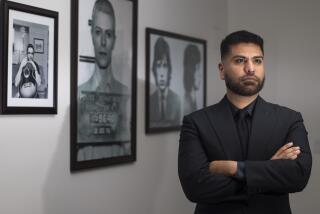High Profile Was Tony Alamo’s Downfall : Fugitive: Religious cult leader ran businesses and appeared on radio talk shows, using cellular phones, aliases and mail drops to elude authorities.
- Share via
Though hunted across the nation by federal agents, religious cult leader Tony Alamo lived an open, if not completely public, life before his capture this month in Florida.
For nearly three years, the fugitive preacher wanted on child abuse charges in Los Angeles often traveled the country--almost always with an entourage of followers or at the very least a chauffeur. Investigators say that he started and operated businesses from coast to coast. He dropped in on the mayors of some of the cities he visited. He called newspaper editors and radio talk shows. His sermons--often tape-recorded denouncements of President Bush, the Pope and the investigators who trailed him--could be heard on as many as 50 radio stations each week.
In Tampa, Fla., which authorities say was Alamo’s home base during much of the time he was a fugitive, the fundamentalist preacher and his followers operated a hardware store and had recently opened a family-style restaurant. Investigators said Alamo was so involved in running these businesses that he interviewed salesmen and ordered all the supplies. He designed the restaurant’s menus. His business card from the hardware store said: “We’re bigger than you think!”
Authorities said Alamo, 56, lived in a rented $300,000 home on a canal that empties into scenic Old Tampa Bay. He kept $12,000 in a drawer. And every day at 1 p.m., he could turn on the radio and hear one of his own sermons broadcast by a radio station across the bay.
“He did pretty well for himself,” Deputy U.S. Marshal Wayne F. Fuchs said. “He lived good--for a wanted man.”
But it was Alamo’s high profile lifestyle and reliance on his followers that ultimately led to his capture and may result in the end of his Holy Alamo Christian Church. A task force of federal agents monitored the gathering in Tampa of Alamo followers from across the country and followed them to him.
Even at the end of his run, the flamboyant preacher seemed surprised. Handcuffed and sitting on the driveway outside his waterfront home, he looked up at the federal agents who had just arrested him and said: “How’d you guys find me?”
“Divine guidance,” he was told.
Controversy has followed Alamo since the early 1970s, when he and his then-wife, Susan, began taking busloads of young dropouts, drug addicts and drunks from the streets of Hollywood to a compound in Saugus where they were treated to fire-and-brimstone admonitions that included Alamo’s anti-government and anti-Catholic beliefs.
The growing church organized branch communes in Nashville, Tenn., and the Ozark Mountains of Arkansas and operated numerous businesses, including the manufacture of a popular line of expensive denim jackets that carried the preacher’s designs.
But the growth was accompanied by allegations that children were abused in the communes, that Alamo’s followers were brainwashed and forced to work for little pay and that he lived luxuriously off the profits. Alamo received widespread attention when his wife died in 1982 and he predicted she would be resurrected. He reportedly placed her embalmed body on display in an Arkansas commune for six months.
In 1985, Alamo’s church was stripped of its tax-exempt status after the Internal Revenue Service determined that it was a profit-making enterprise. Three years later, the preacher with a penchant for Western-style clothing disappeared as Los Angeles County authorities investigated the beating of an 11-year-old boy that allegedly occurred at the Saugus commune. Authorities said Alamo directed the beating from another location via telephone.
Now, in the wake of his capture, federal authorities are trying to document the holdings of Alamo and his church and collect more than $7 million in back taxes as well as retrace his trail as a fugitive.
Fuchs, part of a 10-agent task force that tracked and captured Alamo, said investigators believe Alamo settled in the Tampa Bay area almost immediately after fleeing California.
Authorities said Alamo had a core group of followers that helped him evade capture. Prosecutors have described these followers as bodyguards--”Christian soldiers” ready to protect their pastor with weapons if needed.
“They assisted him, they protected him,” FBI agent Donald Geisler testified this month in a Tampa courtroom, where Alamo was seeking bail. Geisler said former Alamo followers have told investigators that the group has access to automatic weapons and that “Mr. Alamo and his bodyguards should be considered armed and dangerous.”
The contention that Alamo’s group is armed or violent angers church followers. They point out that numerous searches have never turned up weapons on church property.
Ray Arauz, a Los Angeles follower of Alamo who the FBI said is an Alamo bodyguard, scoffed at such a contention.
“I am nobody’s bodyguard,” said Arauz, 41. “I have my own family to watch out for. This just shows the government harassment that is going on here. The whole thing is very unfair.”
Aside from the dispute over bodyguards and weapons, it is apparent that Alamo--nearly blind from glaucoma and unable to drive--was routinely in the company of several followers while he was a fugitive.
Federal agents say they have documented proof that he moved from a house in Madiera Beach, near Tampa, earlier this year when a neighbor complained to police about the large number of people who stayed at the home and about the late-night comings and goings of the entourage.
Billy Johnson operates a private mailbox store next to the Big Time Discount hardware store that authorities said Alamo opened in Pinellas Park, across Old Tampa Bay from his rented house. Johnson said Alamo, using the name Harvey Cochran, made several visits to the store each week, always arriving in a van with four or five men. Alamo always carried a cellular phone, Johnson said.
“They did no advertising, some days they didn’t even open,” said Johnson, who became suspicious of his neighbor. “It was like they were in business but they didn’t care if they got any business.”
Investigators said Alamo frequently moved his household, used cellular phones, mail drops and numerous aliases, all of which hindered his arrest.
The FBI said Alamo made calls from Tampa using cellular phones registered in New Jersey. It is not possible to trace calls to their point of origination. This allowed him to frequently call newspapers and a Nashville radio talk show hosted by his brother, Dan Hoffman, without fear of giving away his whereabouts.
As an example of how he tried to prevent his mail from being traced, investigators said, Alamo sent tapes to be broadcast on radio station WRFA-AM in nearby Largo to a post office box in New York. A follower would pick up the tapes, then remail them so they arrived at the Florida radio station with New York postmarks.
Investigators said they know of at least seven aliases used by Alamo while he was a fugitive.
Known as Cochran at the hardware store, his name was G. Elmo Justine at the waterfront home he rented in Tampa. After Alamo was arrested, agents found a business card in his wallet from a restaurant called Wild Child’s in Temple Terrace, northeast of Tampa. The card belonged to “H. Colling,” general manager of the restaurant.
Federal agents went to the restaurant and learned that Colling was Alamo, who had orchestrated the opening of the restaurant two weeks earlier, making all the decisions right down to the design of the restaurant’s logo and menus. The agents also learned that several of the restaurant’s employees were followers of Alamo’s church who had moved to the area to be near their pastor.
Investigators believe that the profits from the businesses started by Alamo and operated by his followers helped the fugitive preacher finance new ventures as well as avoid capture.
The federal task force was formed in May after authorities received information that numerous Alamo followers were flocking to Tampa, said Mike Blevins, chief deputy marshal in Ft. Smith, Ark.
The migration of followers to Tampa had in part been spurred by the seizures of numerous church properties in California, Arkansas and Tennessee to satisfy IRS tax liens.
Other properties were seized to pay a $1.8-million court judgment won against Alamo by a family of former followers who charged that the preacher had abused children, alienated family members and violated labor laws. That case prompted more criminal charges against Alamo when he called up a Ft. Smith newspaper and allegedly threatened the life of the judge who heard the suit.
But some Alamo followers said their arrival in Tampa was a coincidence. Rick Tiner, an Alamo follower for 20 years, said he moved there without knowing that Alamo was nearby. “Other brothers of the church said it was a good area to get a new start,” Tiner said.
Blevins said task force agents located many of Alamo’s known followers by checking applications for Florida drivers licenses.
That started nearly two months of surveillance, as the agents waited to be led to Alamo. The plan paid off July 3, when agents followed a church member from the Big Time Discount hardware store to a house in the Tampa neighborhood of Palma Ceia.
They watched the house for two more days--until on the morning of July 5, an overweight man with an unkempt gray beard and thick, dark glasses stepped out the front door and picked up the morning newspaper in the driveway.
“That’s our subject,” one of the deputy marshals whispered into his radio, a low-key report that signalled the end of Alamo’s run.
A few hours later, the task force moved in.
More to Read
Sign up for Essential California
The most important California stories and recommendations in your inbox every morning.
You may occasionally receive promotional content from the Los Angeles Times.













